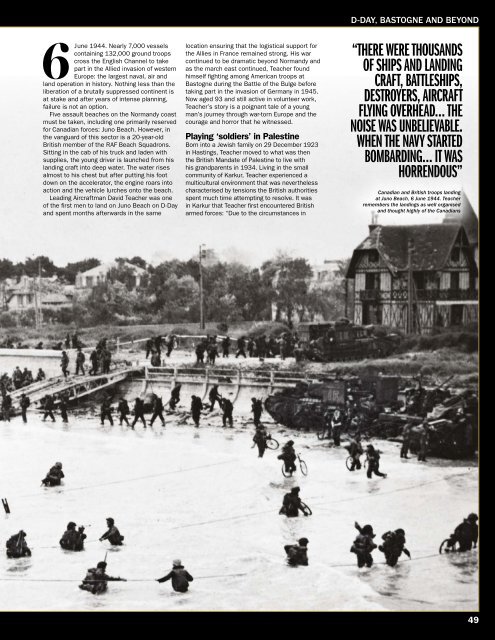Create successful ePaper yourself
Turn your PDF publications into a flip-book with our unique Google optimized e-Paper software.
6<br />
June 1944. Nearly 7,000 vessels<br />
containing 132,000 ground troops<br />
cross the English Channel to take<br />
part in the Allied invasion <strong>of</strong> western<br />
Europe: the largest naval, air and<br />
land operation in history. Nothing less than the<br />
liberation <strong>of</strong> a brutally suppressed continent is<br />
at stake and after years <strong>of</strong> intense planning,<br />
failure is not an option.<br />
Five assault beaches on the Normandy coast<br />
must be taken, including one primarily reserved<br />
for Canadian forces: Juno Beach. However, in<br />
the vanguard <strong>of</strong> this sector is a 20-year-old<br />
British member <strong>of</strong> the RAF Beach Squadrons.<br />
Sitting in the cab <strong>of</strong> his truck and laden with<br />
supplies, the young driver is launched from his<br />
landing craft into deep water. The water rises<br />
almost to his chest but after putting his foot<br />
down on the accelerator, the engine roars into<br />
action and the vehicle lurches onto the beach.<br />
Leading Aircraftman David Teacher was one<br />
<strong>of</strong> the first men to land on Juno Beach on D-Day<br />
and spent months afterwards in the same<br />
location ensuring that the logistical support for<br />
the Allies in France remained strong. His war<br />
continued to be dramatic beyond Normandy and<br />
as the march east continued, Teacher found<br />
himself fighting among American troops at<br />
Bastogne during the Battle <strong>of</strong> the Bulge before<br />
taking part in the invasion <strong>of</strong> Germany in 1945.<br />
Now aged 93 and still active in volunteer work,<br />
Teacher’s story is a poignant tale <strong>of</strong> a young<br />
man’s journey through war-torn Europe and the<br />
courage and horror that he witnessed.<br />
Playing ‘soldiers’ in Palestine<br />
Born into a Jewish family on 29 December 1923<br />
in Hastings, Teacher moved to what was then<br />
the British Mandate <strong>of</strong> Palestine to live with<br />
his grandparents in 1934. Living in the small<br />
community <strong>of</strong> Karkur, Teacher experienced a<br />
multicultural environment that was nevertheless<br />
characterised by tensions the British authorities<br />
spent much time attempting to resolve. It was<br />
in Karkur that Teacher first encountered British<br />
armed forces: “Due to the circumstances in<br />
D-DAY, BASTOGNE AND BEYOND<br />
“THERE WERE THOUSANDS<br />
OF SHIPS AND LANDING<br />
CRAFT, BATTLESHIPS,<br />
DESTROYERS, AIRCRAFT<br />
FLYING OVERHEAD… THE<br />
NOISE WAS UNBELIEVABLE.<br />
WHEN THE NAVY STARTED<br />
BOMBARDING… IT WAS<br />
HORRENDOUS”<br />
Canadian and British troops landing<br />
at Juno Beach, 6 June 1944. Teacher<br />
remembers the landings as well organised<br />
and thought highly <strong>of</strong> the Canadians<br />
49


















